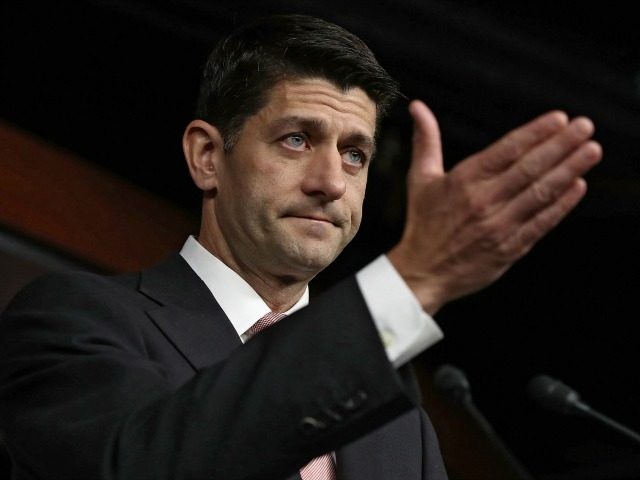Six years ago, when the Tea Party revolt had just begun, Rep. Paul Ryan (R-WI) was considered a hero by the grass-roots conservative movement.
The ranking member of the House Budget Committee had already published a plan, the Path to Prosperity, that anticipated public concern over government spending and debt. He also led the challenge to Obamacare, pointing out — to President Barack Obama’s face — the administration’s duplicity in double-counting cuts to Medicare.
And so when moderate Mitt Romney won the 2012 Republican presidential nomination, almost by default, he reached out to conservatives by picking Ryan as his running mate. Tea Party activists cheered Ryan, seeing his selection as a sign that the GOP was taking spending and entitlements seriously. Social conservatives also rejoiced, given Ryan’s staunchly pro-life record. Ryan also had an appetite for taking conservative arguments to the minority communities where they are heard least.
Ryan’s appeal to conservatives from different factions is the reason he was the overwhelming choice to replace John Boehner as Speaker of the House. His managerial competence, and calm demeanor, have kept the fractious lower House from falling apart. And through all the tumult of 2016, he has articulated a conservative policy agenda on poverty, an issue the left thinks it owns.
In sum: Ryan (who declined to be interviewed for this article) has grappled, like no conservative before him, with the immense fiscal threat to the future of our nation, and he has developed entitlement proposals that substitute individual initiative for government dependence.
Moreover, Ryan has taken that case into the heart of the Democrats’ most reliable constituencies, where conservative solutions could make the greatest difference. He has been an anchor, keeping the Republican Party grounded in principles during a tumultuous political time.
So–what happened? Why are some targeting one of the boldest and brightest leaders conservatives have produced?
There are two reasons. One is Ryan’s own doing.
In the wake of the 2012 presidential election — a contest even Ryan thought Republicans would win, right up until the fading hours of Election Day — Ryan returned to Washington determined to govern, rather than oppose. His logic was that since conservatives would have to wait at least four years for a Republican in the White House, the best way forward was to find the most favorable compromises with the administration, avoiding costly shutdowns.
A key component of that governance was to be immigration reform. Ryan has long believed that immigration is a boon to the economy and the entitlement system. And Ryan, like many other Republicans, blamed the 2012 loss on the party’s rhetoric against illegal immigration. The sooner the issue had been dealt with, the sooner Republicans could appeal to the country’s growing Latino electorate. Ryan also hoped that sensible immigration reform could showcase his new governing approach.
Ryan misread the mood of his own party — overestimating its tolerance for immigration reform without border security first, and underestimating the appetite for strong opposition to Obama’s agenda in general. To his credit, he responded, rejecting the Senate’s “comprehensive” immigration reform bill and holding the line against gun control. But he left room for his critics by negotiating budget deals with the White House that broke the “sequester” caps and trimmed increases to veterans’ pensions.
The second reason some conservatives are targeting Ryan is simply that he is a symbol of the Republican establishment in Washington — an establishment that fears and loathes Donald Trump, and which hoped Ryan would resist the insurgency. Ryan fueled that expectation, somewhat carelessly, when he delayed endorsing Trump. But he eventually made good on his promise to back the party’s nominee — for which he has been mercilessly attacked by the “#NeverTrump” Twitter brigades.
No one is irreplaceable. But in Ryan, the Republican Party has found a rare combination of intellect, courage, and decency. The conservative movement will not easily find another leader who is willing to risk the scorn of both base and Beltway to do what he thinks is right.
Perhaps Ryan is ill-suited to the role of an opposition leader, a role conservatives urgently wish to fill. But he is ideal for the governing role in which he finds himself, and he would do even better under a Republican president.
Ryan has faced a vigorous primary opponent in Paul Nehlen — and good for him for holding the Speaker accountable. The polls seem to indicate that Ryan is safe, though stranger things have happened.
But if Ryan were to be defeated, he would be the second solid conservative to fall in recent days, after Rep. Tim Huelskamp (R-KS) — who frequently challenged the party hierarchy — lost his primary last week. These are not people the conservative movement can easily afford to lose.
The best case against Ryan is that he has been insufficiently aggressive in fighting Obama’s agenda — or in fighting for Trump. But that is not how Ryan sees his role. He believes he has a responsibility to govern, not to lead the opposition (as Ted Cruz has often done). That may be the wrong approach, but it is not a disqualifying one. And Ryan has not yet had the chance to prove himself by passing legislation with a Republican president available to sign it.
The fight is not as simple as pro- or anti-Trump. It reflects a growing ambivalence about governing itself, one I described in my e-book Wacko Birds: The Fall and Rise of the Tea Party. Obama’s defiance of the constitutional rules has sewn a spirit of anarchy on both right and left. Ryan is one of the only people with the vision to transcend our political crisis. He is Ralph, still holding the conch in Lord of the Flies as the jungle burns.
Without him, there is only a battle of wills — one we may not win.

COMMENTS
Please let us know if you're having issues with commenting.